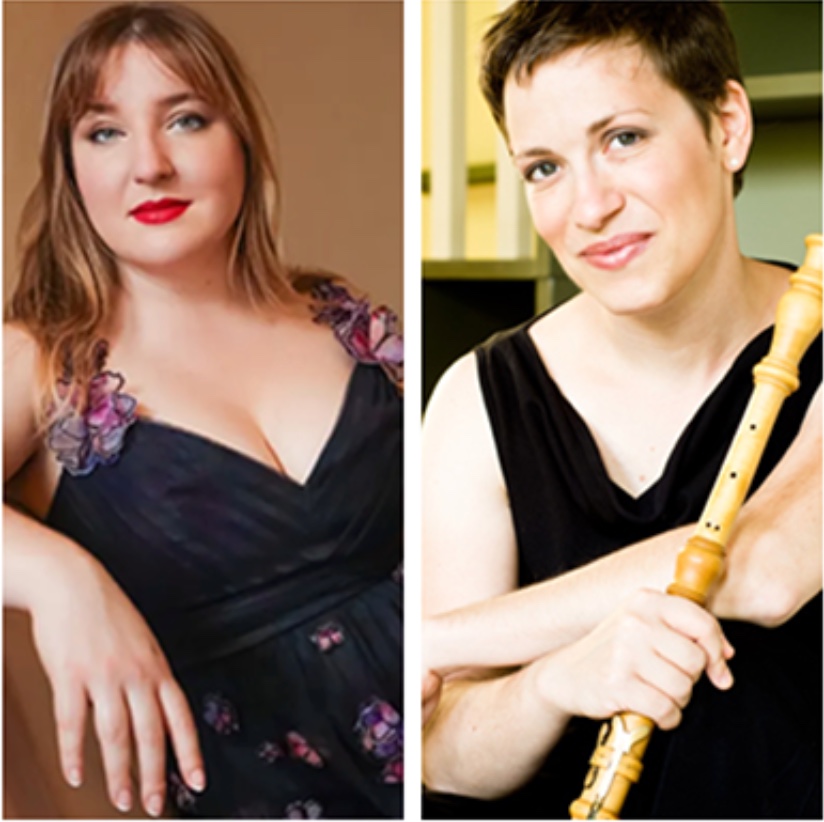by Mike Telin

“Arcadian Dreams” features works for soprano and chamber ensemble by Jean-Philippe Rameau and a young Georg Frederic Handel, rarely-performed pieces by Louis Lefebvre and Thomas Louis Bourgeois, and music by Arcangelo Corelli and Domenico Scarlatti.
The premiere performances are on Saturday, October 19 at 2:00 pm at the Hudson Library & Historical Society — click here for a seating reservation — and Sunday, October 20 at 7:30 pm at Harkness Chapel. Tickets are available online.
I caught up with Les Délices oboist and artistic director Debra Nagy and soprano Hannah De Priest by Zoom. I began by asking them how the project came about.
Hannah De Priest: I sang with Les Délices for their debut at the Boston Early Music Festival in 2023. It was a fun program of witchy French Baroque stuff, like Circe, Medea, and Fedra. The music was super dark and highly dramatic, but beautifully rendered by the composers.
After that, Debra called and said, “I think we should record a CD.” My immediate thought was “she must want to do more witchy stuff.” But actually she told me that she wanted to do something more cheerful. And I’m so happy that we changed direction.
I think the program highlights Les Délices’ calling card — celebrating the well-known names, or relatively well-known names, of the French Baroque and French High Baroque. They also have an appetite for a scholarly but creative approach to names that people haven’t heard of. So this CD and this concert will have both of those in balance.
Handel’s cantata Mi palpita il cor is fabulous. And there are two small scale cantatas by Bourgeois (Diane et Endimion) and Lefebvre (Le lever de l’Aurore) that I think everyone will love because they’re so charming.
Debra Nagy: These concerts will be the modern premieres for both of those, which I’m very excited about. And neither have been recorded. I think the first movement of the Lefevre was recorded in the last five years, but not the complete cantata.
Rameau’s Le Berger fidèle is such a masterpiece, but people don’t think of him as anything but an opera composer or maybe a composer for keyboard.
And thematically, I think the program has a really nice through line with this idea of Arcadia, or even the Arcadian Academy in Rome, and this bridge between Italy and France.
Mike Telin: I always think of Handel writing oratorio: did his cantatas fall out of style or are they simply neglected?
DN: I think they’re mostly just in the shadows. In the 18th century, every composer’s route to success, or route to the greatest visibility, was in big public events. And there’s no bigger public event in the world of 18th century culture than the opera. Or, as it turned out for Handel later, when the Italian opera had failed, the big public event was the oratorio.
Most people know Handel as a self-borrower — he wrote a lot of music, but he recycled a lot of his own music too. And people know that he started in Germany and ended up in England, but they may or may not know that there was an important stopover a couple times in Italy early in his life. Some of the most riveting, experimental music that he wrote was in Italy, and that music ended up being recycled over and over again once he arrived in England.
MT: When you were doing the research, were there any big surprises?
HDP: When I was at Case Western, all the students spent a lot of time rummaging around dusty libraries. And one thing I loved was spending hours rummaging around Gallica, and I hadn’t done that in so long.
DN: It’s the digitized library of the Bibliothèque nationale in France. It’s the database of all of their scanned materials.
HDP: It’s incredible how much music is out there that is not known. I think there was this incredible sense of discovery in early music in the 1970s, but I think for a lot of people, that sense of discovery has kind of lessened a little bit. And this a good reminder that there’s still so much worthy repertoire out there to be explored, recorded, and performed.
MT: Debra, were there any surprises for you about the repertoire?
DN: I’m not sure about surprises so much as anticipation. I have been wanting to produce or perform music by Louis Antoine Lefebvre for a while. He is a direct contemporary of Rameau, and his orchestrations are beautiful and delicate, and harmonically rich, in a similar way to Rameau — except we don’t know Lefebvre at all.
When I was looking at repertoire and thinking about this Arcadian theme, I came across this cantata by Lefebvre that fit beautifully into the program. It opens with this very effective sunrise scene in the violins. I’m so glad to finally do some Lefebvre and this piece has so much beautiful imagery, it’s also a real sound painting with the instrumental parts.
MT: The Harkness performance is part of the Early Music America Summit.
DN: It’s a great opportunity to have this be part of the Summit. And it’s going to be wonderful to have our local audience to become more aware of the goings on of Early Music America. It will also be great to have members of Les Délices’ national audience, and the field, sharing the space with us as well. There are some people who are going to be attending that concert who have only gotten to experience Les Délices through the SalonEra series, so I think this is a wonderful kind of synchronicity, as it were.
The Early Music America Summit runs from October 20 through 22. Click here to find out more about concerts, lectures, and panel discussions.
Published on ClevelandClassical.com October 17, 2024
Click here for a printable copy of this article



